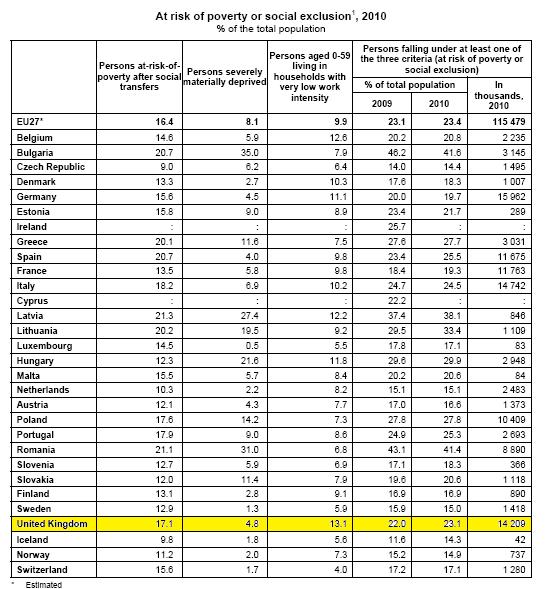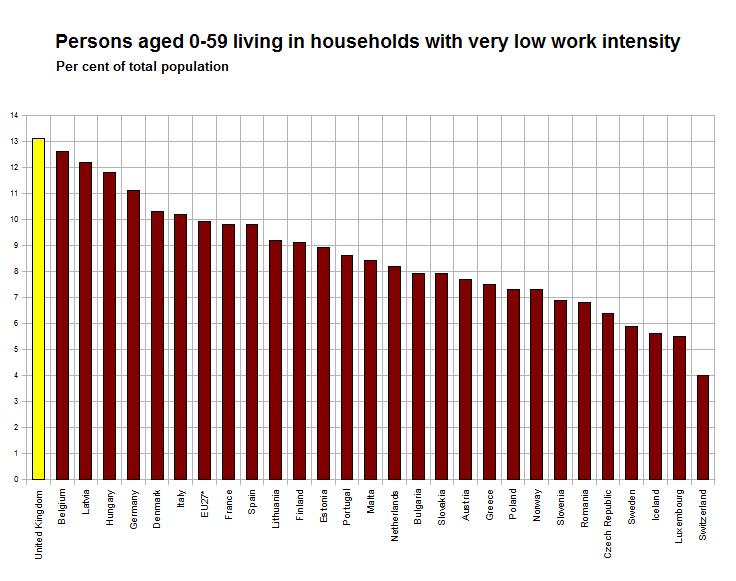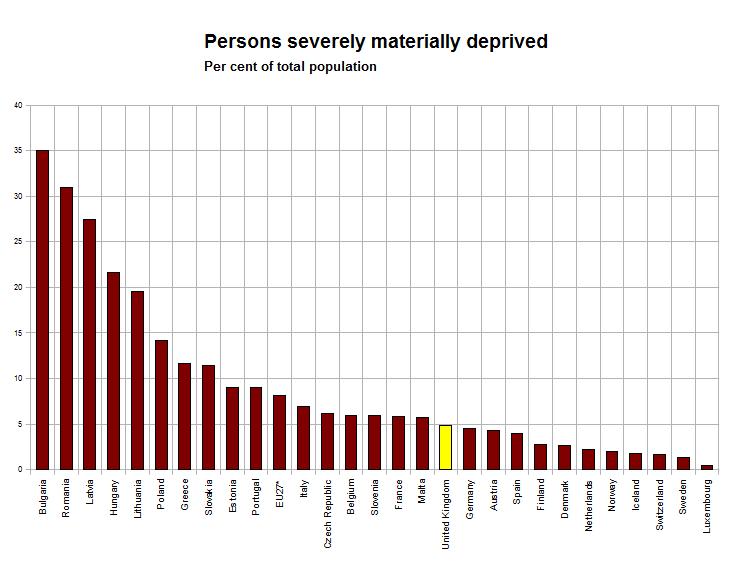Does the UK have more homes where nobody has a job than anywhere else in Europe?

"Britain has Europe's highest rate of people living in homes where no one has a job, it was revealed yesterday."
Daily Mail, 9 February 2012
Following the latest release of Eurostat figures on poverty and social exclusion, the Dail Mail this morning ran with the headline that Britain had more homes where nobody has a job than anywhere else in Europe.
They highlighted that the UK topped the Europe league table of 'no adult working' households while performing far better on Eurostat's table of "severely materially deprived" persons in households. This was seen as a sign of the UK's faulty welfare system.
But did the Mail interpret the statistics correctly?
Analysis
The figures used by the Mail are drawn from a Eurostat news release which outlines statistics from 2010 on persons at risk of poverty and social exclusion.
The Mail's headline figures can be found in the table below, which gives the proportion of the population in EU and non-EU countries falling into these categories:

The UK indeed tops the EU league table on the measure of 'Persons aged 0-59 living in households with very low work intensity'. With 13.1 per cent on this measure, it leads Belgium on 12.6 per cent and Latvia on 12.2 per cent.

Meanwhile, on 'persons severely materially deprived' the UK's rate is quite low, with 4.3 per cent compared to a peak of 35 per cent in Bulgaria. The reporting of the figures in themselves by the Mail was accurate.

However, examining the Eurostat data, there was no evidence of the Mail's defintion that 'persons living in households with very low work intensity' was the same as 'homes where no one has a job'.
The best available definition is available in Eurostat's full statistical release on the matter:
"People living in households with a very low work intensity are defined as people of all ages (from 0-59 years) living in households where the adults (those aged 18-59, but excluding student aged 18-24) worked less than 20% of their total potential during the previous 12 months."
The methodological notes further state:
"For each household the work intensity is calculated by dividing the sum of all the months actually worked by the working age members of the household by the sum of the workable months in the household — i.e., the number of months spent in any activity status by working age members of the household.
A working age person is defined as a person aged 18-59 years, not being a dependent child (dependent children are individuals aged 0 to 15 years or 16 to 24 years if inactive and living with at least one parent). A work intensity equal or inferior to 0.20 is considered as very low."
In fairness to the Mail, they mention later on in their article that the 13.1 per cent refers to the proportion of the population that lives in a home where no adult works for 20 per cent of their time.
However, there is still no mention in these definitions of households where "nobody works". So Full Fact put the Mail's definition to Eurostat's statistics team. They informed us:
"Based on this definition, people living in homes where no one has a job are included, but also people living in homes where adults work very little (for example, household of 2 adults and 2 children, of which 1 adult doesn't work, another works 40% of his/her time, work intensity of the household = 20%).
"Therefore to interpret the measure as "people living in homes where no one has a job" is not strictly correct."
Conclusion
While the Mail reports many of the statistics accurately in their report, the newspaper has been over-zealous in its headline definition of the figures.
It is not strictly correct to claim that the UK has more homes where 'nobody works' than any other European country since this excludes households where adults work very little.
As Eurostat themselves confirmed, while some of the homes would lack a working adult, the Mail's interpretation fails to adequately reflect what the figures actually mean.